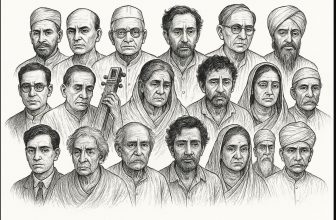India’s past is filled with jobs that once seemed indispensable, the town crier shouting news in narrow alleys, the water carrier delivering fresh drinking water to homes, or the letter writer crafting emotions for strangers. Each of these roles tells us something about how people lived, communicated, and relied on one another.
But as times changed, through new laws, new machines, and new ideas, many of these professions disappeared. They weren’t replaced overnight. Some faded slowly. Others were banned. And a few simply lost their meaning in a modern world.
Here are 10 such historical professions that once played a vital role in Indian society, but now exist only in memories, photographs, or films.
1. The Town Crier (Dhandora Wala)
Before loudspeakers or WhatsApp groups, town criers were the original information network. With a hand drum or bell, they walked the streets making public announcements, from royal orders to market changes or festival timings.
They were especially common in villages and princely states before Independence. But once newspapers, radio, and local administration offices became widespread, the need for a human news-deliverer disappeared.
2. Human Computers
In the days before calculators and software, people performed large-scale mathematical operations by hand. These “human computers” worked in astronomy centers, survey departments, and even for astrologers.
In colonial India, they played a vital role in mapping projects, bridge construction, and temple architecture. Their numbers dwindled in the 1970s when electronic calculators entered the Indian market.
3. Letter Writers (Patra Lekhak)
Outside post offices in cities and railway stations in rural areas, you’d often find men sitting with wooden boxes, ink pens, and paper, helping people write personal letters, legal applications, or money orders.
They served illiterate or semi-literate populations. As literacy spread and mobile phones became affordable, this quiet profession vanished.
4. Professional Mourners (Rudaalis)
In parts of Rajasthan and Bihar, it was once customary to hire women to wail loudly at funerals, not as a performance, but as part of the mourning ritual. These rudaalis were expected to express grief on behalf of families who were either too shocked, too composed, or too status-conscious to cry openly.
Modern cremation practices, urban migration, and the rise of private mourning spaces slowly eroded the cultural space for this role.
5. Water Carriers (Bhistis)
Armed with goatskin water bags (mashks), bhistis were a common sight in cities like Delhi and Lucknow. They carried water to households, construction sites, and military camps, pouring it into clay pots and metal vessels.
With the spread of piped water supply and motorized tankers, this job disappeared from Indian streets. But the word ‘bhisti’ still survives in literature and old Bollywood songs.
6. Snake Charmers (Saperas)
They were once symbols of Indian exoticism, men sitting cross-legged on streets, coaxing cobras from baskets with their flutes. But these weren’t just entertainers. In many tribal areas, they also acted as local healers and handled snakebite cases.
After the Wildlife Protection Act of 1972, keeping snakes became illegal. Combined with growing urban disapproval and conservation awareness, the saperas lost both their audience and their livelihood.
7. Postal Runners (Dak Runners)
Long before India had a railway or highway network, dak runners were essential. Wearing metal ankle bells to announce their presence, they sprinted across villages carrying letters, money orders, and government dispatches.
They often ran barefoot for dozens of kilometers, facing forests, heat, and floods. Once bicycles and postal vans took over, the job was phased out quietly.
8. Street Dentists and Bone Setters
These unlicensed practitioners offered everything from tooth extractions to fractured bone fixes, often under a tree or beside a market stall. They used herbal pastes, metal pliers, or splints made of bamboo and cloth.
Though a few still operate in rural belts, legal crackdowns and the spread of modern hospitals have pushed most of them out. Their services may have been risky, but they were once the only affordable option for many.
9. Astrologer-Scribes in Temples
Not every astrologer read horoscopes. Some maintained temple records, birth star calendars, and caste-based lineage documents. They acted as human archives, preserving family history and festival timings.
As astrology software, online kundli calculators, and printed panchangs took over, these temple-based roles faded away, especially in urban temples where pujaris now handle most administrative tasks themselves.
10. Weighmen (Taraju Wale)
In wholesale mandis, weighmen once stood beside grain carts with massive iron scales balanced on shoulder-length beams. They manually measured sacks of rice, wheat, and pulses, and ensured both buyer and seller agreed on quantity.
With the rise of electronic scales, digitized mandi systems, and standardized packaging, the taraju wale became obsolete in most markets.
Summary – A journey through professions that once defined India but faded away
Some of these jobs disappeared because of progress, others because of pain. Caste systems, economic inequality, and lack of alternatives meant that many of these roles weren’t glamorous. But they were still essential, and for centuries, they were part of how India functioned.
Learning about them isn’t just nostalgic. It reminds us how societies evolve, how technology can both liberate and displace, and how every generation creates, and then retires, its own way of working.
History isn’t just in textbooks. Sometimes, it’s in the vanishing voices of a town crier or the quiet tapping of a letter writer outside a post office.





